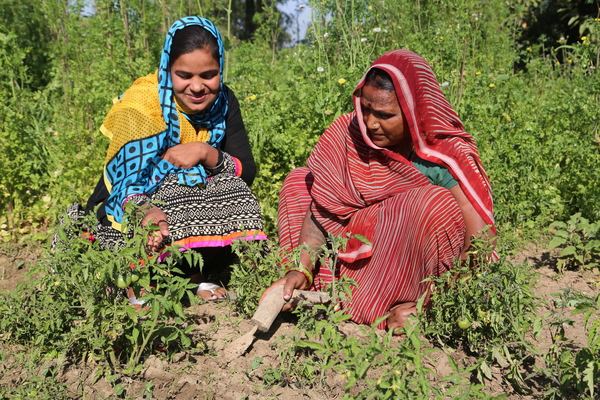Breakfasts for Better Days (And a Better World)
Welcome to the Global Goals, Local Leaders series, where we highlight innovative American businesses that are acting as local leaders to support and promote the United Nations’ Sustainable Development Goals.
Company: Kellogg Company
Sustainable Development Goal: #2 Zero Hunger
More than your favorite name in the cereal aisle, Kellogg Company is a task force for global food security and Sustainable Development Goal #2, Zero Hunger. On World Food Day, we spoke to Kellogg about their commitment, their actions, and their goals for a better future. Learn how Kellogg’s impact is just as much local as it is global.
The United Nations’ Sustainable Development Goal (SDG) #2 is Zero Hunger. How is Kellogg increasing global food security?
Kellogg Company’s purpose is nourishing families so they can flourish and thrive. Fighting hunger and feeding potential – while simultaneously addressing several SDGs – are at the core of this work. Across our value chain, from farm to family table, we’re focused on doing our part to achieve SDG2 – Zero Hunger, SDG5 – Gender Equality, SDG12.3 – Food Loss and Waste, SDG13 – Climate Action, and SDG17 – Partnerships.
As a leading global food company, our initiatives naturally focus on interconnected issues of hunger, climate and sustainable food systems through integrated commitments to nutrition, hunger relief and sustainability. We approach this work through our global signature cause platform, Breakfasts for Better Days™. Overall, our goal is to create three billion Better Days for people around the world by the end of 2025. We’re making great progress against our goals. In 2017, we:
- Supported 300,000 farmers, their families and communities with climate-smart agriculture practices to increase yields, improve climate resiliency and reduce post-harvest food loss and waste.
- Expanded feeding and nutrition education programs so that 586,772 children could reach their full potential;
- Donated 7,451 Kellogg employee and retiree volunteer days at local community food banks, farms and breakfast programs; and,
- Provided 570 million servings of food to people in need, often in partnership with hundreds of food banks, across six continents.
- Engaged 66 million people in our efforts to address food security through promotions, online engagement and social media participation.
How does Kellogg advance its mission to strengthen and advance local communities through sustainable agriculture? As part of this work, how does Kellogg support farmers around the world?
We are nurturing our planet and addressing food security by supporting farmers, their families and farming communities across our value chain by sourcing responsibly, improving climate-smart agriculture practices and protecting soil health, water quality and habitats.

Sourcing responsibly – Through our foods, we are helping to unlock the potential of communities around the world. Our commitment to responsibly source our 10 priority ingredients by 2020 is a key way we are doing so. This work starts on the farm, supporting the people and communities who grow our ingredients. That’s why, as part of Breakfasts for Better Days, we’ve pledged to improve the livelihoods of 500,000 farmers by advancing climate-smart agriculture practices that increase productivity and climate resiliency, while using fewer natural resources. To date, we’ve engaged more than 300,000 farmers toward our 2025 goal.
While farmers all over the world are grappling with the challenges posed by climate change, smallholder farmers often face the greatest risk due to increased challenges such as access to market, finance and crop failure insurance, plus a lack of information on climate-smart agricultural practices. Kellogg recognizes that smallholder farmers play a critical role in a global food supply, first for themselves and their families, but increasingly for broader food security opportunities in rural or impoverished communities.
That’s why we’ve already provided support to more than 20,000 smallholder farmers in our direct supply chain and have similarly focused programs with more than 10,000 women farmers.
Improving sustainable agriculture – Much of our work in sustainable agriculture is done through our Kellogg’s Origins™ Program. More than 40 Kellogg’s Origins™ projects around the world are active today, built in partnership with suppliers, farmers, scientists and non-governmental organizations (NGOs) to increase productivity, improve environmental outcomes and positively impact farmer livelihoods.
For example, we are developing a value-added supply chain of potatoes for use in Pringles® in Bangladesh for the Asian market. Through our partnerships with suppliers and USAID, we have engaged more than 1,000 Bangladeshi smallholder farmers to expand the use of sustainable agricultural practices, including training on farming practices and post-harvest storage practices. Yields were between 25-100 percent higher compared to the national average, which resulted in higher profit margins for contract farmers, and meaningful improvements to their livelihoods.
Another example is Kellogg Company’s organic kitchen garden project with TechnoServe in the rural areas of India’s state of Madhya Pradesh, where maternal and child undernutrition levels remain persistently and unacceptably high. This program is helping families improve their nutrition intakes by helping women cultivate small vegetable gardens. As a result, 75 percent of households are now eating vegetables twice a day, and 22 percent three times a day. The program has improved nutrition deficiencies in protein, calcium, vitamin A and iron, and increased energy intake, which was below recommended levels. Women are also selling the surplus from their gardens, which helps to improve their livelihoods.
Protecting soil health, water quality and habitats-Soil health is increasingly recognized as a key contributor to healthy ecosystems, improving both climate resilience and farm profitability. By improving soil health, we improve water quality, increase drought resilience and reduce greenhouse gas emissions, better enabling farmers to feed the world’s growing population and honor our commitment to nurturing our planet
One example of our work in this area is our co-chairmanship of the Midwest Row Crop Collaborative (MRCC) that brings together three international NGOs and nine multinational companies to focus on soil and water quality in the U.S. Upper Mississippi River Basin. MRCC’s goal is to demonstrate the economic and environmental benefit of soil health practices to farmers in this important agricultural region.
Why is the goal of eliminating global hunger so important to Kellogg? And how is Kellogg teaching / equipping the next generation?
In 1906, when W.K. Kellogg founded our company to provide a healthier breakfast option, he set out to change the way people ate breakfast and he ended up changing the world. He wasn’t only a brilliant business person, he was one of the world’s early conservationists and a leading philanthropist. He instilled in our company the values that continue to inspire us today. So, from our earliest days, Kellogg has been a purpose-driven organization, a company with a heart and soul. This approach continues to set us apart.

Recently, the Food and Agriculture Organization of the United Nations (UNFAO) released a new study indicating that world hunger continues to rise [1]. In its report, the UNFAO said that solutions require “accelerated, scaled-up and multi-year partnerships to address increasing food security concerns.” Supporting wellness – including playing our role in eliminating hunger – is essential as we fulfill this purpose, collaborating with customers, government leaders, partners and people who enjoy our foods, to make sure there is enough food for everyone in a world with a growing population and increasingly limited natural resources.
These collaborations take many forms:
- Kellogg was a founding member of FReSH (Food Reform for Sustainability and Health), formed in January 2017 by the World Business Council for Sustainable Development and the EAT Foundation to accelerate transformational change in global food systems. FReSH aims to ensure healthy diets for all, produced responsibly, within planetary boundaries by 2030.
- Along our value chain – primarily on farms, in our own operations and with consumers – Kellogg is reducing food loss and waste to ensure that food grown and made goes to human consumption whenever possible. Doing so is a win-win. We help support public health and community wellness and, at the same time, reduce the natural resources needed to feed the world’s population. As a leader addressing food security, Kellogg was one of the first companies to join Champions 12.3.
- As a grain-based company, we’re looking at grains for their unique benefits, including the fact that they use less natural resources to produce than other foods. This is increasingly important when we consider how we can help address food security. Already, 83 percent of our foods are vegetarian. We continue to invest in this space through our eighteen94™ Capital fund that is pursuing next-generation start-up businesses, including several plant-based nutrition and protein companies.
We also believe that improving gender equality (SDG5) helps address food security. On average, women represent 43 percent of the agricultural labor force in developing countries [2] and up to 30 percent of all farmers in the United States[3]. Women are a critical link in the agricultural sector and food production systems, yet they often lack the opportunities needed to enable them to reach their highest potential.
Through our dedicated programs, Kellogg empowers and educates women and girls in communities around the world where our ingredients are grown. We work to ensure that our suppliers implement programs, and government policies are in place to help achieve gender equality and economic empowerment providing education, tools, and training to help improve their livelihoods. We continue to identify women farmers and workers in our value chain and develop programs to help improve their livelihoods, their families and communities.
What should consumers be on the lookout for next as Kellogg continues its work to increase and promote food security?
Look for Kellogg to continue our innovative and integrated solutions to address wellness, hunger relief and sustainability through our foods and corporate responsibility initiatives. We know that no one can achieve the ambitious SDGs alone, which is why the dedication of our passionate team of colleagues and our many partnerships around the world are so important. Will also continue engaging suppliers, customers, shoppers and consumers in these important, interrelated issues.
More information on Kellogg Company’s efforts aimed at addressing global food security and achieving zero hunger is available in our
[1] 2018 The State of Food Security and Nutrition in the World, Food and Agricultural Organization of the United Nations
[2] FAO, 2014 State of Food and Agriculture.
[3] USDA 2012 Census of Agriculture
What to Watch: David Beasley, Executive Director of the United Nations’ World Food Programme, has a powerful message for Americans and UNA-USA members: each one of us has a role to play in combatting global hunger.




